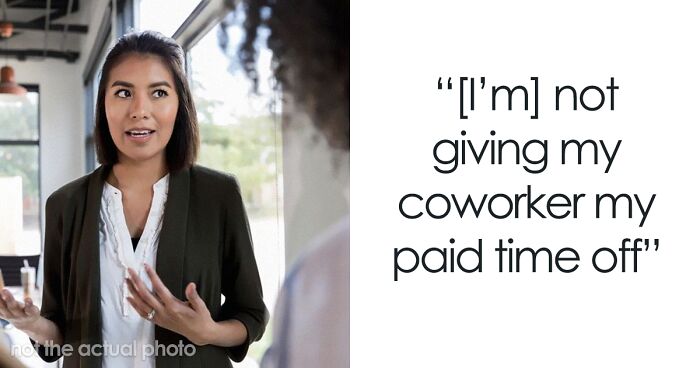
Childless Woman Refuses To Give 6 Of Her Paid Vacation Days To A Coworker With Three Kids, Office Drama Ensues
The United States is the only country in the Organization for Economic Cooperation and Development, a group made of 36 of the world’s wealthiest nations, that doesn’t require employers to give workers annual paid leave, according to the Center for Economic and Policy Research.
That leaves 23 percent of Americans with no paid vacation and 22 percent without paid holidays. So as you can imagine, if an employee is given paid time off, they take it pretty seriously. No wonder that when the 25-year-old childless worker and the author of this post on r/AITA was asked by her 41-year-old colleague with kids to share her accumulated vacation days, the answer was negative.
“She wants me to give her 6 of my days. Her justification is that I’m childless and don’t need that many days,” the author explained. But after telling her she cannot give away her hard-earned days, the office drama ignited, so let’s read on below for how it ended.
If you have some thoughts on this incident you want to share with others, let us know in the comment section!
The 25 Y.O. childfree woman has shared a story of how her co-worker with kids demanded that she give away her vacation days so she could spend time off with her kids

Image credits: SDI Productions (not the actual photo)
It’s no secret that American births are declining, and it has partly to do with the fact that most millennials now believe that there’s more to life in the post-2008 economy than bearing kids. The stats from the Centers for Disease Control and Prevention (CDC) prove the statement. Their report revealed the US birth rate had fallen by 4%, the sharpest single-year decline in nearly 50 years and the lowest number of births since 1979.
So it’s only likely that the differences between people from different generations who have and don’t have kids are becoming more and more apparent. It’s especially true with people spending a lot of time together, like friends, family members and co-workers. Employees with kids may feel like they’re entitled to more acknowledgment, empathy and even rewards, but this is just not fair to their voluntarily childfree counterparts who consciously made this kind of choice.
Today, the conversation about voluntary childlessness is becoming more relevant and empowering to younger generations, and women in particular, as ever. “No one is obligated to do it if they don’t want to or aren’t ready,” the three women who created “Childfree Girls Podcast” told Bored Panda. They added that we would be genuinely surprised how many people have no idea that “they can choose not to become parents.”
The common disagreements between childfree people and parents may also have to do with the fact that previous generations, boomers in particular, saw having offspring as something courageous, mature and thoroughly encouraged. The Childfree Girls explained: “people say ‘have a child’ cavalierly, as if it isn’t the monumental job parents will often tell you it is, but it is the most personally impactful decision an individual can make, permanently affecting not only the parents’ lives, but the life or lives those parents create.”
In the midst of the pandemic, companies were more eager to reward employees with children
Meanwhile, it seems like our society is still pretty much hostile to childfree workers. At various big tech companies, during the covid-19 outbreak in the autumn of 2020, parents dealing with child care were given more time off and bonuses that were once tied to performance. The Timesreported that some employees without children complained that the new benefits based on caregiving status were unfair, and that the childless were expected to pick up the slack from parents who were no longer pulling their own weight at work.
In response to the situation, people dubbed the childfree people “selfish,” a tag many of them are tired of hearing. Laszlo Bock, Google’s former head of human resources said that “for people to get upset enough to say that ‘I feel this is unfair’ demonstrates a lack of patience, a lack of empathy and a sense of entitlement.”
And this is what people had to say about this whole situation
It turns out that both parts, employees with kids and without, are unhappy
In the times of the pandemic, when everyone’s working from home, people without children are picking up a much heavier paid workload, showed a Bloomberg report. Meanwhile, parents and mothers especially are able to work less, showed the same report.
It’s only fair to see childfree people who are burdened with an immense workload feel resentment and even anger towards their counterparts with kids. At the same time, parents with kids feel completely drained after the year spent homeschooling, working from home, and little leisure time if any.
It seems like both parts are equally unhappy, so what can be done about it? Share some thoughts in the comments!
The main issue isn’t with either of the employees. A company that makes you use your holiday allowance when your brother dies is the problem. By allowing people to give their leave to other colleagues is essentially moving the issue to their employees rather than offering fair access to time off to their employees. The a hole is the company
I sort of agree with you, but surely " paid time off" is just that. Not necessarily for holidays , just time off work for whatever reason you choose. I think it was fine for the woman with kids to ask, but she definitely became TA when she started to guilt trip op for saying no.
Load More Replies...She shouldn't have even planned the vacation if she didn't have any time.
The real AH is the American system that doesn't give enough mandatory PTO and no days for a sick child or a relative's death. The secondary AH is the co-worker who thinks she is entitled to anything from her colleagues because she has children.
in Belgium we have 21 payed vacationdays a year (minimum) by law that you have to take. And lots of extra public holidays. totals around 27days
Load More Replies...The main issue isn’t with either of the employees. A company that makes you use your holiday allowance when your brother dies is the problem. By allowing people to give their leave to other colleagues is essentially moving the issue to their employees rather than offering fair access to time off to their employees. The a hole is the company
I sort of agree with you, but surely " paid time off" is just that. Not necessarily for holidays , just time off work for whatever reason you choose. I think it was fine for the woman with kids to ask, but she definitely became TA when she started to guilt trip op for saying no.
Load More Replies...She shouldn't have even planned the vacation if she didn't have any time.
The real AH is the American system that doesn't give enough mandatory PTO and no days for a sick child or a relative's death. The secondary AH is the co-worker who thinks she is entitled to anything from her colleagues because she has children.
in Belgium we have 21 payed vacationdays a year (minimum) by law that you have to take. And lots of extra public holidays. totals around 27days
Load More Replies...
 Dark Mode
Dark Mode 

 No fees, cancel anytime
No fees, cancel anytime 






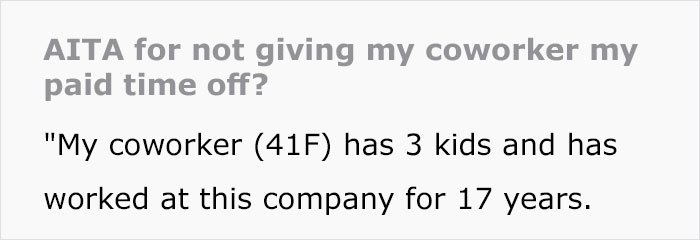
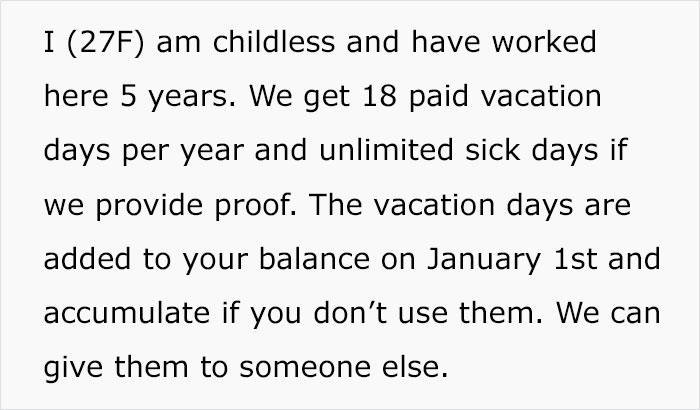
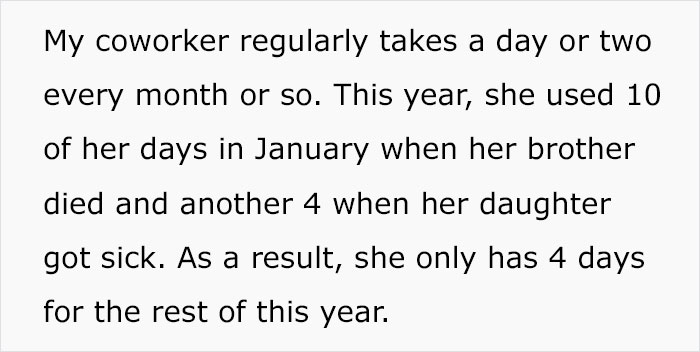
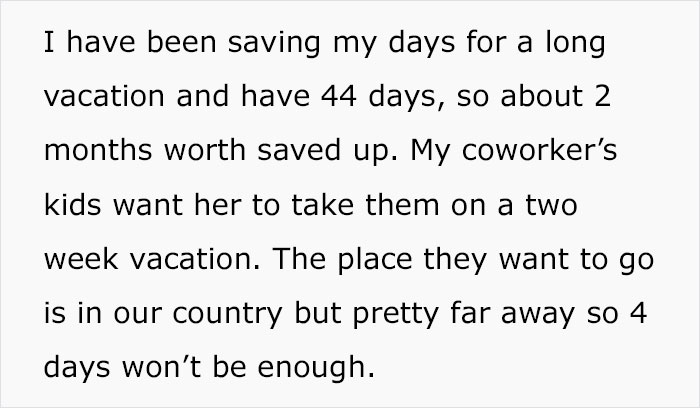
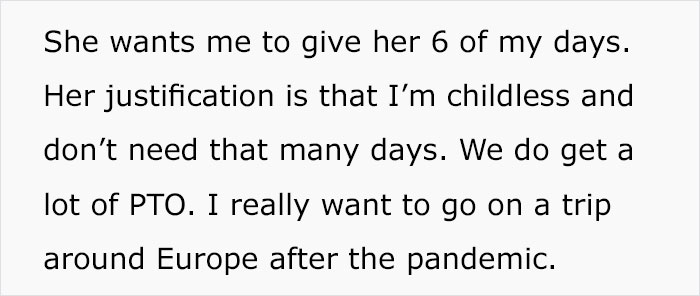

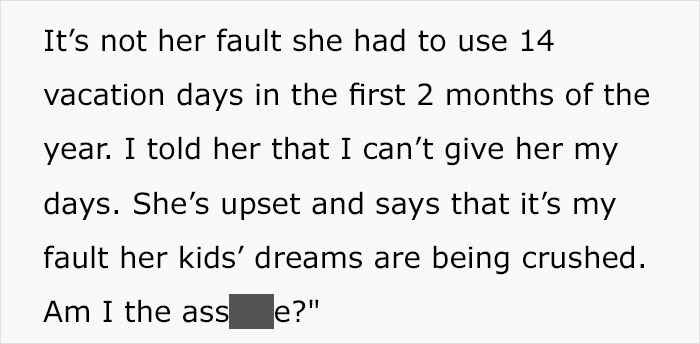
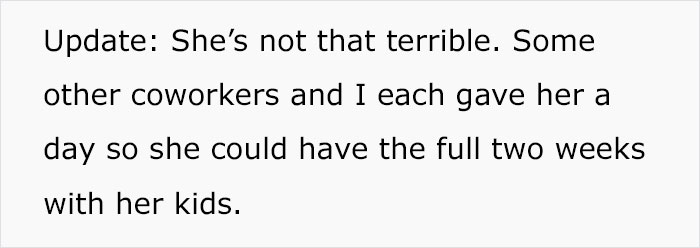
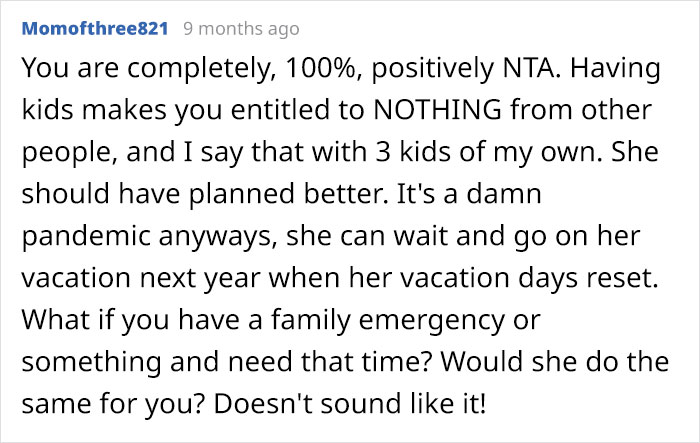
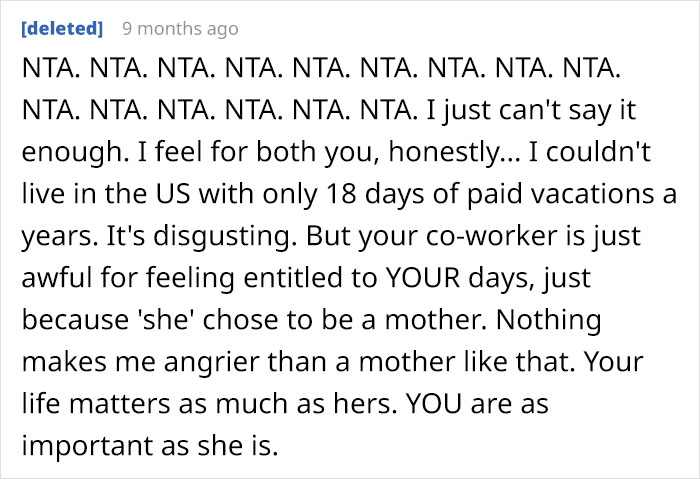
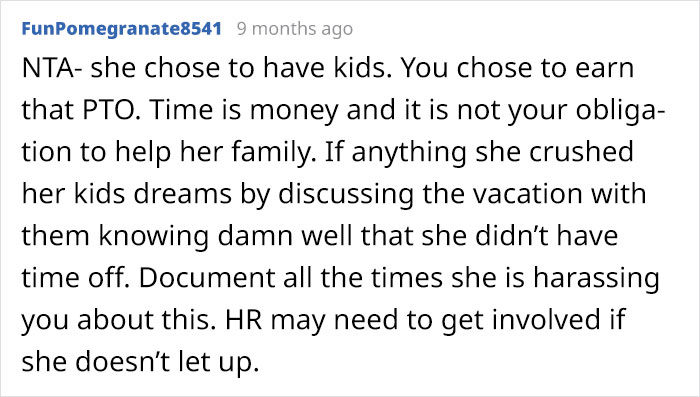


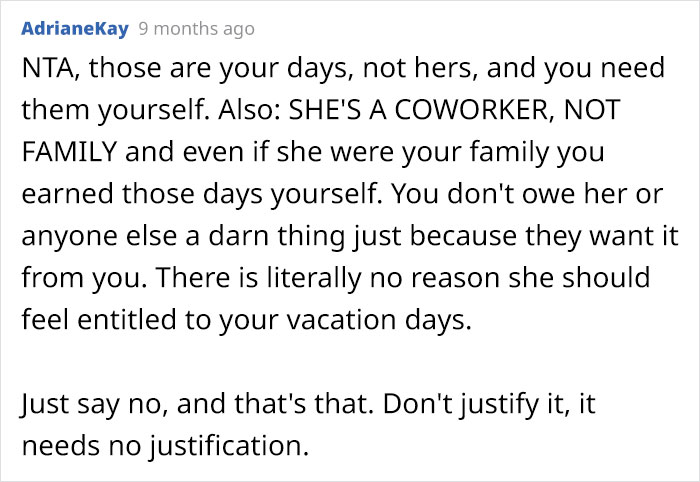
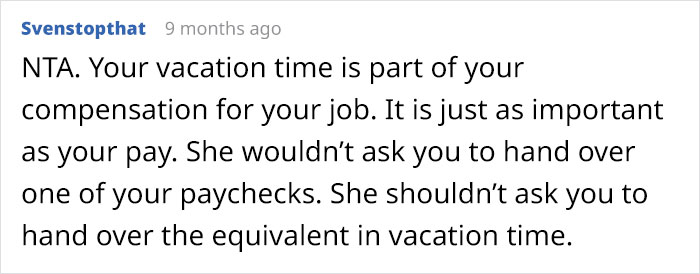

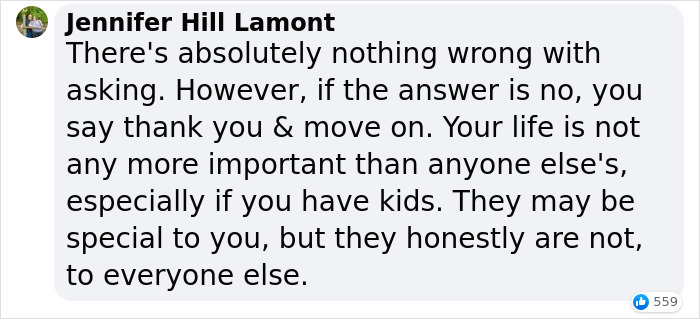
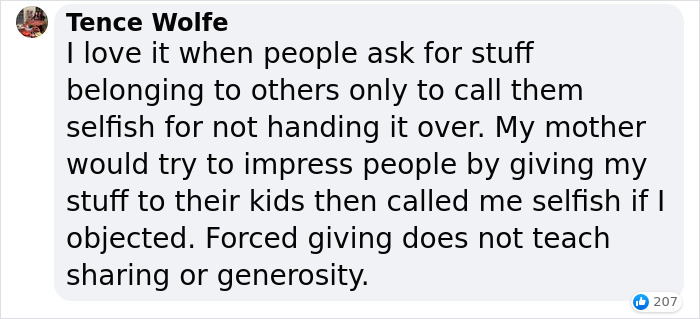
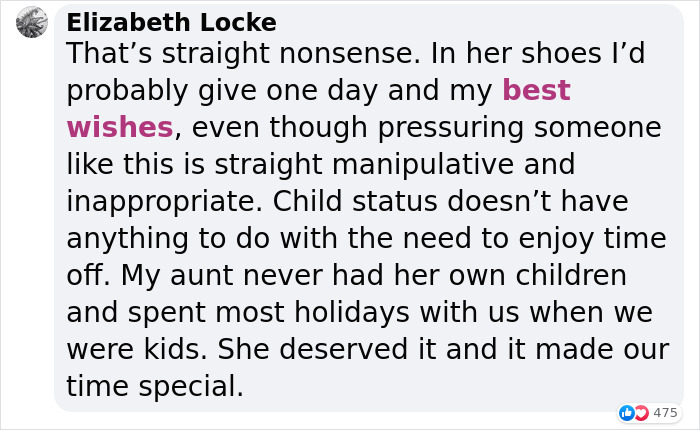









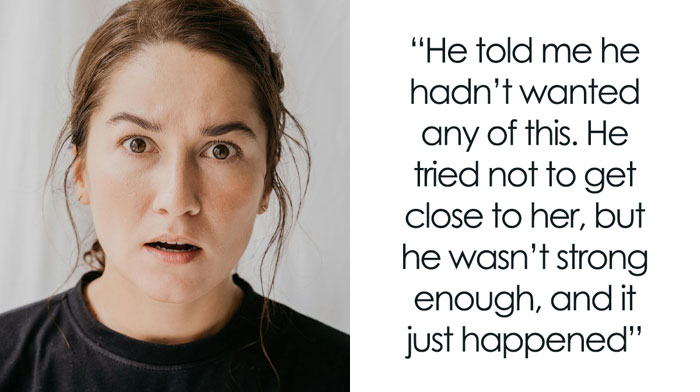

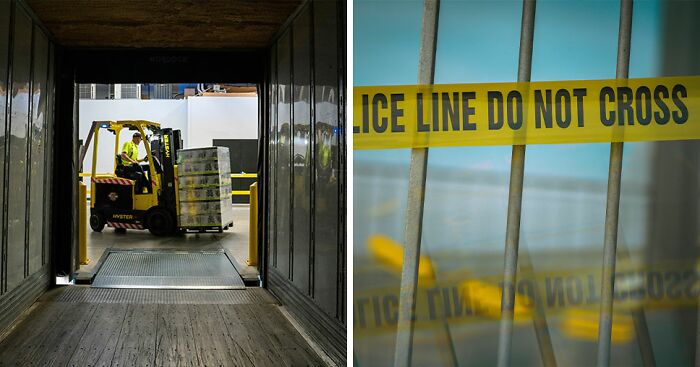

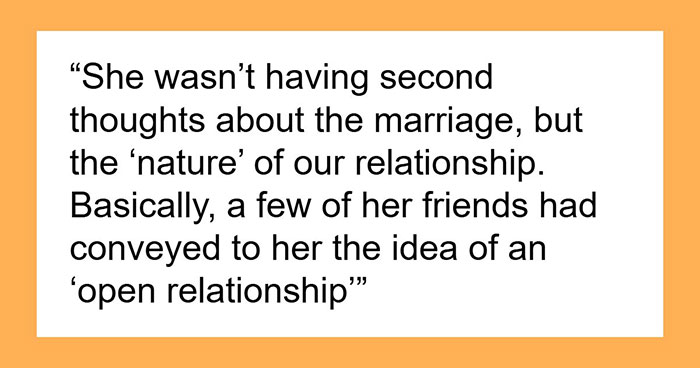






























204
213